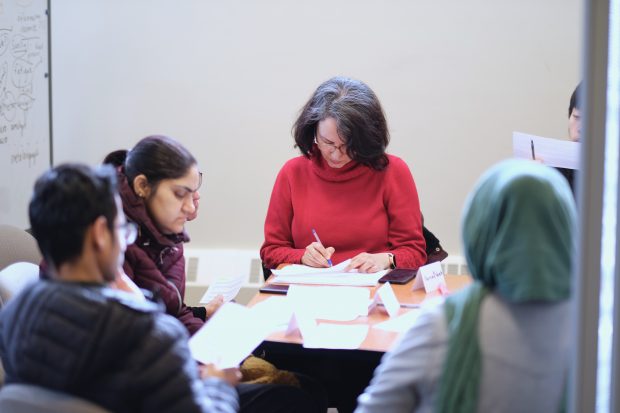You are currently visiting our programming space. We also have a site hosted on the University of Victoria main website. You may also want to check out our spaces for Graduate Writing and Discipline-Specific Writing.
Visit us in the Library Learning Commons hallway, offices 135 i-m. We are here 9am to 4pm Sunday to Friday for booked and drop-in appts, with Saturday and evening appts online at peak times.
winter 2025 programs
Are you wondering where to get personalized help with academic communication and learning skills? We work with you one-on-one, offering advice on academic writing, reading, presentations, time management and more! Appointments are in person or online, through same-day written feedback or real-time Zoom appointments.
Whether you’re getting started with your assignment and need help understanding the instructions and organizing your schedule, or you’ve completed your draft and want to refine it, we’re here to help!
On this page you will find information about:
- Student Appointments
- English Café
- Grad Writing Room
- Learn Abouts
- Undergrad Workshops
- Grad Workshops
- Online Resources
Student Appointments (available every day!)
Students can self-book up to three 25-minute appointments. For additional appointments, email the CAC manager. We offer tips and advice on the following:
| Writing skills | Reading skills | Presentation skills | Speaking skills | Time management skills |
| Understand your assignment | Read strategically | Prepare to present | Pronounce discipline-specific words | Manage your time and set goals |
| Prewrite and plan | Read for research | Deliver your presentation | Communicate in groups | Reduce stress and concentrate |
| Draft, revise, and self-edit | Think critically | Pace your presentation | Gain confidence | Prepare for tests |
English Conversation Café Plus: An opportunity for UVic students with English as an Additional Language
2025 dates/times TBA | Please email cacmgr@uvic.ca for sched updates | Centre for Academic Communication
Conversation Café: practice listening, reading, and discussion skills; receive informal coaching on vocabulary use and pronunciation; and get tips for developing fluency and confidence. No registration required. Facilitated by members of the CAC team
Grad writing room
9 to 12pm Tuesdays and 1 to 4 pm, Wednesdays | September 10 to December 4 | Centre for Academic Communication
Bring your laptop; we’ll work on our individual writing projects alone, but we’ll be together for solidarity. CAC tutor available for consultation from 1 to 2pm. No registration required; we’ll meet in Library 151b.
“Learn About…” individual workshops, by appointment
Need a grammar refresher? Make an appointment for an individual “Learn About…” workshop on the following topics:
- Pronouns & agreement: Discuss sentences like “Each struggle/struggles with their/his/her agreement.” (Nancy; cacmgr@uvic.ca)
- Active/passive voice: Get tips on strategic use of active/passive voice in your sentences. (Gillian; gillians@uvic.ca)
- Commas, semicolons, and colons: Enrich your punctuation toolkit through humorous examples! (Emily; earvay@uvic.ca)
- “A” or “The”? That is the question! Get all your questions answered about nouns, articles, and more! (Kaveh; kaveht@uvic.ca)
January workshops (all welcome!)
Online Resources
We have resources available to you 24/7 on our CAC website, our Brightspace site, and our graduate student community blog:
- Check out this new resource hub: UVic LEARN
- Visit our resources for text handouts and short videos on popular topics, such as defining your thesis, writing strong paragraphs, and becoming an effective reader.
- CAC Online Brightspace is self-enrolling—once you are signed into UVic Brightspace, go to “Discover” in the top menu and find “CAC online.” Once you are in the site, explore multi-modal material about all types of academic communication plus resources just for graduate students.
- Our Graduate Student Writer’s Community blog publishes posts about the graduate student experience, many by graduate students (please consider writing a blogpost for us!). Check out the Dissertation Writers’ Resource tab for articles on many aspects of writing a thesis (not just for PhD students).



